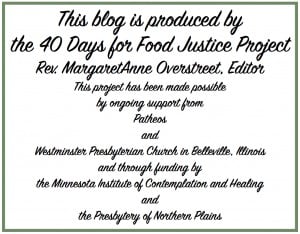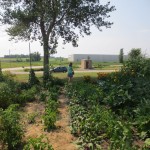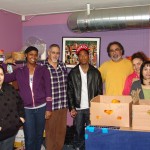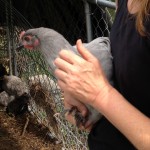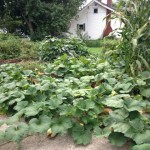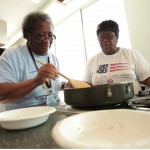Just Eating, with Children
by Rev. Rebecca Barnes
As a parent, I often feel like I’m fighting an uphill battle to help my kids to eat healthy food and to value the kind of food purchases that builds a more just food economy. They accompany me to the farmers’ market, but they aren’t as amazed as I am at the new life these markets bring to our community. They eat the vegetables that I put in front of them, but they don’t necessarily taste the difference between grocery store and farm fresh.
Meanwhile, they are constantly hungering after bright colored, artificially produced, heavily packaged “food” that was produced in ways that I’m pretty certain weren’t fair to food workers all along the chain nor are they foods that are good to their bodies or to the earth.
So when I recently saw Anna Lappe’s video “The Myth of Choice: Is Junk Food Really What We Crave?”, I felt comforted. Not by the knowledge that we really are fighting an uphill battle against food policies and corporations who pour money into creating our children’s cravings, but by the knowledge that this battle is no different than the other ones I take on. It was a chance for me to claim my power as parent and as consumer, once more.
When I hold any value strongly, I try to live it out and to teach it to my kids, even if it is counter-cultural. This is the glorious hard work of being a parent (or teacher or mentor or friend to a young person): that we get to share our lives and choices and values, the things we think are vitally important. Like, food justice- for our bodies, for other people’s dignity, and for the earth’s protection. I am better at my commitments when I am trying to share them with my children. As I try to teach and shape them, so I myself learn and am transformed.
In reality, I am secretly tickled when my daughter rolls her eyes, mocking me to her friends in a high-pitched voice that “everything in this house is organic.” I don’t mind this particular sassiness because I think, she’s getting it, at some level, that these actually are our family’s values. In the grocery, she has begun to turn over packages and look at the ingredients (how many, and what they are), to detect if it is a likely candidate for our shopping cart (or not).
And, it’s okay with me that the Amish banana bread or pumpkins to carve at Halloween are the more exciting parts of the Farmers’ Market, rather than the kinds of things that excite me. These little people are still growing up getting food from local sources in a way that wasn’t as readily available when I was their age. And the great feeling of introducing this good, fresh food from local farmers to my children—that is often enough motivation to get me there, when I might not otherwise go.
Whether my children fully understand it or not, or whether their taste buds appreciate it or not, or whether I’m always as consistent as I’d like to be, we are striving to build a better food system, healthy bodies, and justice for people and all the earth, just by the ways we eat. We aren’t perfect. I definitely indulge our cravings for treats. Yet, we are trying to be attentive and intentional, and it affects all of us, maybe most of all me.
In the end, I hope we all remember the natural food section and outer perimeter of the grocery is where we spend most of our shopping minutes and that the farmers’ market is our best place for treats (including fruit and vegetable treats!). I hope we get the taste of local, seasonal vegetables more than the beloved year-round supply of grocery carrots, broccoli and beans. I hope that we begin to look for the faces of farmers more than the fancy packaging of overly processed foods. I want us to know where food comes from, what the earth needs to produce it, and how to respect people who help get it from the ground to the table.
If this is an uphill battle, it is worth it. For parent, child, human, it is worth it. The health of our bodies, the health of other people’s bodies and communities and economies, and the health of the planet—it is worth it.
——————–
Joining the Presbyterian Hunger Program in May 2012, Rebecca Barnes has been the Associate for Environmental Ministries for the Presbyterian Church (USA) since December 2011. Particularly she oversees the national PC(USA) certification program for Earth Care Congregations, coordinates the volunteer local leadership network called the Environmental Ministries Action Network, and works to help Presbyterians connect their Christian discipleship to ecological, economic and global justice concerns. She is also the author of 50 Ways to Help Save the Earth: How You and Your Church Can Help Make a Difference.
———————————-
Lenten Calendar for MARCH 20
Want to see what factory farms are really like? Watch fowlplaymovie.com (Not for the faint of heart.)
————————————
Sign up to receive the daily meditations by email, or like us on Facebook.
We need your stories!
We’re already looking ahead to the 40 Days for Food Justice Project for 2016 and we’re looking for more stories, experiences, prayers and resources about food justice and food injustice.
If you would like to contribute – or would like to recommend a contributor – please send us an email and let us know.
About:
In addition to being the founder and editor-in-chief of the “40 Days for Food Justice Project”, the Rev. MargaretAnne Overstreet is a mom, a Presbyterian pastor, and a certified Health Coach. She does ministry with and among the good people of Westminster Presbyterian Church in Belleville, Illinois, where she gets her hands dirty in the community garden and, every Sunday, preaches with bare feet. She treasures family time, relishes every opportunity to teach and write about food justice, and loves to play outside with her dogs. Find out more about her at www.AnInBetweenPlace.com

